
As dairy businesses contemplate
expansion, many now realize they have the means to combat the rising
cost of power and commercial fertilizer as part of their growth, given
the high volume of manure generated as a waste product from their
day-to-day operations.
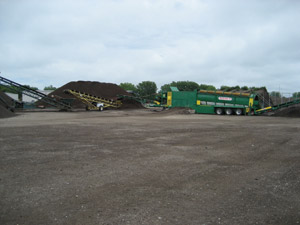 Skyview Dairy has a contract with the City of Hutchinson to provide composted manure for the city’s growing compost marketing business to local nurseries.
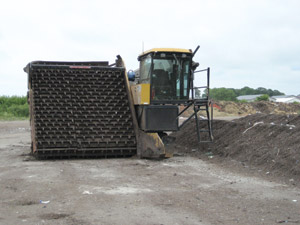
The City of Hutchinson will bring out its compost turner about twice a year to process the manure supplied as the raw material by Skyview Dairy so that it converts to compost evenly. |
Viewing manure by-product as a potential income generator
As dairy businesses contemplate expansion, many now realize they have the means to combat the rising cost of power and commercial fertilizer as part of their growth, given the high volume of manure generated as a waste product from their day-to-day operations.
As a result, they are installing the tools they need to capture maximum value from this by-product.
Minnesota-based Skyview Dairy is just one example of a dairy operation going through a number of significant expansions. Tapping into the full potential of their manure resource is one important new aspect of their overall business plan. They recognize the commercial value of manure as a commodity to produce compost, as a fertilizer alternative for their own use, and as a product capable of being sold to neighboring farms.
“If you asked any farmer 10 to 15 years ago about manure, they’d treat it like a waste,” says Skyview Dairy co-owner and assistant dairy manager, Garrett Luthens. “Today, it’s a commodity that people want to buy.”
He adds that as the price for commercial fertilizer rises, based on nitrogen and ammonia applied per acre, so has the price for manure because of its ability to provide those same nutrients, but from an organic source.
Located 60 miles west of Minneapolis-St. Paul, the Skyview Dairy is in the process of adding about 600 milk cows to its existing herd, bringing the total number of milk cows up to 1600. The dairy was established in 1969 by Garrett’s father, Daryl Luthens. He started out with only 11 cows. Today, Daryl has four sons who are partners with him in the business. Shane is the general dairy manager, Brandon is the financial officer and treasurer, Justin is the crop manager and oversees the heifer operation, and Garrett is the assistant dairy manager. Given his nearly 40 years of experience, Daryl continues to offer advice on dairy operations and on expansion projects.
A number of building construction projects have occurred at the dairy, particularly since about 2002. Since then, Skyview Dairy has constructed three barns and one parlor positioned in an ‘H’ configuration to efficiently manage milk production and manure collection.
To provide for its feed needs, Skyview Dairy seeds 2,500 acres of alfalfa and corn. Any surplus feed left after each season is sold as a cash crop.
As part of its expansion plans, the dairy expects to make a decision on what style of manure anaerobic digester would best fit its operation within the next two years. At present, it generates between 10 and 11 million gallons of manure annually, which will increase significantly once the current expansion is complete.
Skyview Dairy has already made the transition to using solid waste from separated dry manure for bedding. By using the dry manure solids as bedding the dairy saves about $80,000 annually on the purchase of sawdust. Manure digestion will produce a higher quality bedding product that is reduced in bacteria count. Right now, each barn stall is equipped with a mattress layer, followed by a layer of a lime product that is replenished every couple of days, and then a layer of dry manure solid bedding. The lime product helps to eradicate bacteria on the mattresses and in the manure bedding.
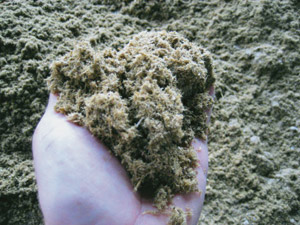
Skyview Dairy uses the hand squeeze test to determine if the separated manure solids are dry enough to recycle as bedding.
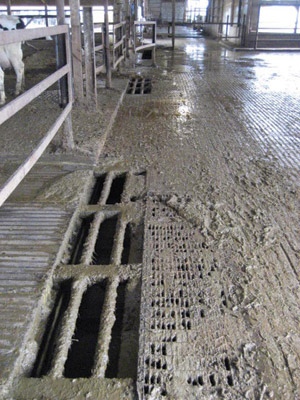
The dry manure bedding is scrapped daily into a central gutter that transports the manure to a FAN separator for recycling.
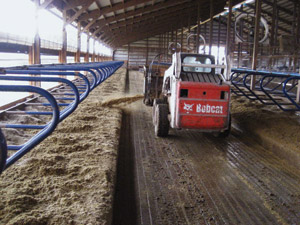
Every day, a skid steer places fresh separated dry manure solids as bedding material in barn stalls. The practice of using dry manure solids saves Skyview Dairy about $80,000 in sawdust costs. |
When the dairy made the transition to dry manure bedding, the milk cows began producing milk with an elevated somatic cell count but that has since tapered off. Managing the somatic cell count continues to require management, which is why the dairy owners are looking forward to the day when the manure is processed through a digester and the solids will have a reduced amount of bacteria.
Conversion of a portion of its manure to compost is something that Skyview Dairy is already doing. In summer, surplus separated solids are applied to alfalfa crops after being stockpiled for about a month. However, during the winter months, whatever manure is not used for bedding is stockpiled and converted into compost through a partnership that the dairy has established with the City of Hutchinson, located about two miles away. The dairy stockpiles about 10,000 yards of manure at a time, which is allowed to sit for about a year. During that time, the city brings out a mechanical compost turner a few times to ensure that the manure pile is successfully making the conversion to compost. After about a year, Skyview Dairy delivers the manufactured compost to the city where it is bagged and sold, primarily to nurseries, as an organic fertilizer.
“This relationship with the city is a good one for us because it helps us to maintain good relations with them, being as they are so close by,” says Luthens.
With the encroachment of development all around them, he says the dairy is spending more and more time on public relations and is keenly aware of how its operations may impact upon neighbors. As a testament to their efforts, a neighbor living only 300 yards away from a dairy barn spoke out in favor of their expansion plans because of how well the dairy has been able to manage any offensive odors from dairy or manure spreading activities.
The City of Hutchinson composting program started about seven years ago. Skyview Dairy became involved in the program right from the start. Initially, the manure was being mixed with other biodegradable material collected by the city. Now, the city makes and markets a compost product strictly from the dairy compost and, in turn, the dairy is compensated at a fixed rate per yard of compost.
The manure management process at the dairy starts with a manure management plan submitted to state authorities. The plan directs when the manure will be applied to cropland, how it will be managed and where it will be applied.
Bedding production
As far as day-to-day operations, Skyview Dairy has established what can best be described as just-in-time bedding production. Starting early in the morning, the dairy starts to process raw manure through a FAN separator, using a squeeze test to determine if the separator is producing manure that is dry enough to use for bedding.
“If you squeeze as hard as you can and no water comes out, it’s dry enough,” says Luthens.
A blower conveys the dried solids over to a storage building, and this process drops the moisture content a few points more. Bedding is changed in the three barns every day and Skyview Dairy has contracted this process out.
Usually by morning, the cows themselves have done a good job of cleaning out their stalls and have pushed a lot of the bedding away into the alleyway so that there is actually very little manure left on the mattresses. A hired hand uses a fork to clean off any manure left on the mats while the cows are being milked. At the same time, two skid steers work simultaneously to push the manure into a central gutter and also to set down new bedding material. The central gutter is equipped with a chain conveyance system that transports the raw manure to a centralized pit, where the manure is agitated using a Houle agitator and two Patz agitator pumps. This manure is eventually separated to either become bedding or is stockpiled. Luthens estimates that about 55 percent of the manure is recycled daily into bedding while the rest is stockpiled. Once enough bedding material has been manufactured, the settings are adjusted on the FAN separator so that it produces a wetter product that is collected and stockpiled for application on alfalfa crops. This reduces wear and tear on the separator. The extra manure solids are collected and removed to the stockpile daily as the dairy management has found the solids tend to heat up quickly if left standing for more than a day.
The liquids accumulated from the separation process are collected in a reception pit. After four to six hours of constant separation, the pit is full and the liquid is transported using a Patz separation pump to one of two lagoons.
The nutrients in the liquid stream also help the dairy cut its commercial fertilizer costs. Skyview Dairy injects the liquid waste collected in its lagoons as organic fertilizer on its cropland. The dairy uses a Hydro-Engineering drag hose system to inject the liquid manure. Luthens estimates that the dairy only purchases about half as much commercial fertilizer as it would normally need by applying the manure effluent and solids as organic fertilizer.
In future, installation of a digester will also provide the dairy with an opportunity to use the methane gas generated by the digester as fuel in power generation, providing the dairy with its power needs. Any surplus power production will be sold through a local utility. Like the composting operation, power generation saves the dairy money and has the potential to provide another income stream to the dairy business.
The combination of all these initiatives generates more income to support all five dairy owners, and for many modern dairy operations, milk is no longer their only income stream. That’s because the value of the manure by-product is finally being recognized.